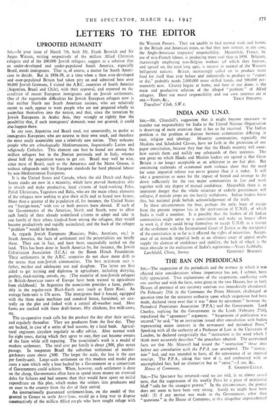INDIA AND U.N.O.
SIR,—Mr. Churchill's suggestion that it might beccme necessary to transfer our responsibility for India to the United Nations Organisation is deserving of more attention than it has so far received. The Indian problem is the problem of distrust between ccmmunities differing in race, religion and ideology. Minority communities, especially the Muslims and Scheduled Classes, have no faith in the protection of any paper constitution, because they fear that the Hindu majority will some- how outwit them and nullify any safeguards of their interests. The one point on which Hindu and Muslim leaders are agreed is that Great Britain is no longer acceptable as an arbitrator to see fair play. But continuing outbreaks of communal mob violence show that the need for some impartial referee was never greater than it is today. It will take a generation or more for the impact of hatred and revenge to die down sufficiently for the two major communities to live and work together with any degree of mutual confidence. Meanwhile there is in imminent danger that the whole structure of orderly government will collapse, if outside props are too hastily withdrawn. Indian leaders know this, but national pride forbids acknowledgement of the truth.
In these circumstances the best, perhaps the only, hope of escape from the present impasse lies in the intervention of U.N.O., of which India is itself a member. It is possible that the leaders of all Indian communities might agree on a constitution and make an honest effort to work it, if they could bring themselves to accept U.N.O. as a trustee of the settlement with the International Court of Justice as the interpretor of the constitution in so far as it affected the rights of minorities. Accept- ance of an outside impartial body as an ultimate court of appeal might supply the element of confidence and stability, the lack of which is the main obstacle to the realisation of India's aspirations.—Yours faithfully,


































 Previous page
Previous page